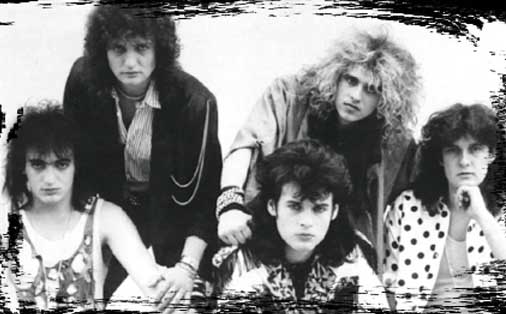- Griva
Infobox musical artist
Name = Griva

Img_capt = The band in the late 1980s
Landscape = yes
Background = group_or_band
Origin =Novi Sad ,Serbia , Yugoslavia
Genre =Hard rock Heavy metal Glam metal
Years_active = 1982 – 1992 (Partial reunions: 2002, 2004)
Label =Jugoton ,Jugodisk ,PGP RTB , Megaton, One Records
URL = [http://www.zlatkogriva.com/ www.zlatkogriva.com]Griva (
Serbian Cyrillic : Грива; trans. "Mane") were a former Yugoslavheavy rock band.Band history
1982 - 1992
The band was formed in 1982 by former Ibn Tup members
Zlatko Karavla (vocals) andJosip Sabo (guitar). Bands first commercial success was aheavy metal cover ofLepa Brena 's song "Sitnije, Cile, sitnije" (Griva's version was titled "Sitnije, sestro, sitnije"). Single with songs "Sitnije, sestro, sitnije" and "Tebi je važna samo lova" was given as a present to buyers of acomic book magazine "Stripoteka ".The first album, "
Kog sam đavola tražio u tebi " ("What the Hell I Saw in You"), released that same year was very successful. Griva became a support band onDivlje Jagode 's Yugoslav tour, but after several concerts, Griva started their own tour. The band also had several concerts outside Yugoslavia, and was an opening band forMotörhead on their concert inPionir Hall inBelgrade . The band refused an invitation of Motörhead's manager to join Motörhead on the rest of their European tour.New material recorded in 1985 was refused as non-commercial by Griva's record label
Jugoton . Album "Nisi ni ti anđeo " ("You're Not an Angel as Well") was released byPanonija Koncert , but it was not followed by presentation in media and a tour. Album featured a cover ofJoan Jett 's song "I Love Rock 'n' Roll ", Griva version titled "I law Myroslaw", the title referring tofolk music singerMiroslav Ilić . After the album was released, Zlatko Karavla recorded "Kaljinka", a provocative song aboutChernobyl disaster with Divlje Jagodefrontman Alen Islamović . After the intervention of some politicans and the Soviet embassy, the song was forbidden for the media.In 1986 the band released self-titled album "Griva", usually referred to as "Vojvodino, Vojvodino, što si tako ravna" ("
Vojvodina , Vojvodina, Why Are You so Flat") after its biggest hit. The new album brought moreglam metal -oriented songs with elements of Vojvodinianfolk music . The album featured a cover of Omega's song "Gyöngyhajú lány", Griva version titled "Devojka biserne kose".In 1988
PGP RTB released band's fourth studio album "Što te tata pušta samu " ("Why Does Your Daddy Let You Go Alone"). In May Griva performed at the international rock festival inBudapest as one of the headliners. After returning to Yugoslavia, Griva held a concert inSpens Sports Center inNovi Sad withSing, sing, singers ,Osmi Putnik ,Viktorija and Alen Islamović performing as band's special guests.TV Novi Sad produced Griva's special show, and Griva went on their last Yugoslav tour.In 1991 band started recording their last studio album, which was, due to the situation in Yugoslavia and the outbreak of
Yugoslav wars , recorded for more than year and a half. The album "Pij, jedi, veseli se... " ("Drink, Eat, Be Happy...") was released in 1992 by private record label Megaton in order for censorship to be avoided. Two videos were recorded but the band did not have any live performances, and Griva disbaned.Reunions
In September 2002 record label One Records released a compilation "
Samo najbolje " ("Only the Best"), and in December the band reunited for anunplugged concertStudio M in Novi Sad. In 2004 the band reunited to perform at Moto Fest in Novi Sad.Discography
tudio albums
#"Kog sam đavola tražio u tebi" (
Jugoton 1983)
#"Nisi ni ti anđeo" (Panonija Koncert 1985)
#"Griva" (Jugodisk 1987)
#"Što te tata pušta samu" (PGP RTB 1988)
#"Pij, jedi, veseli se..." (Megaton 1992)Compilations
#"Samo najbolje" (One Records 2002)
References
*EX YU ROCK enciklopedija 1960-2006, Janjatović Petar; ISBN 978-86-905317-1-4
ee also
*
Serbian rock
*SFR Yugoslav Pop and Rock scene
Wikimedia Foundation. 2010.
